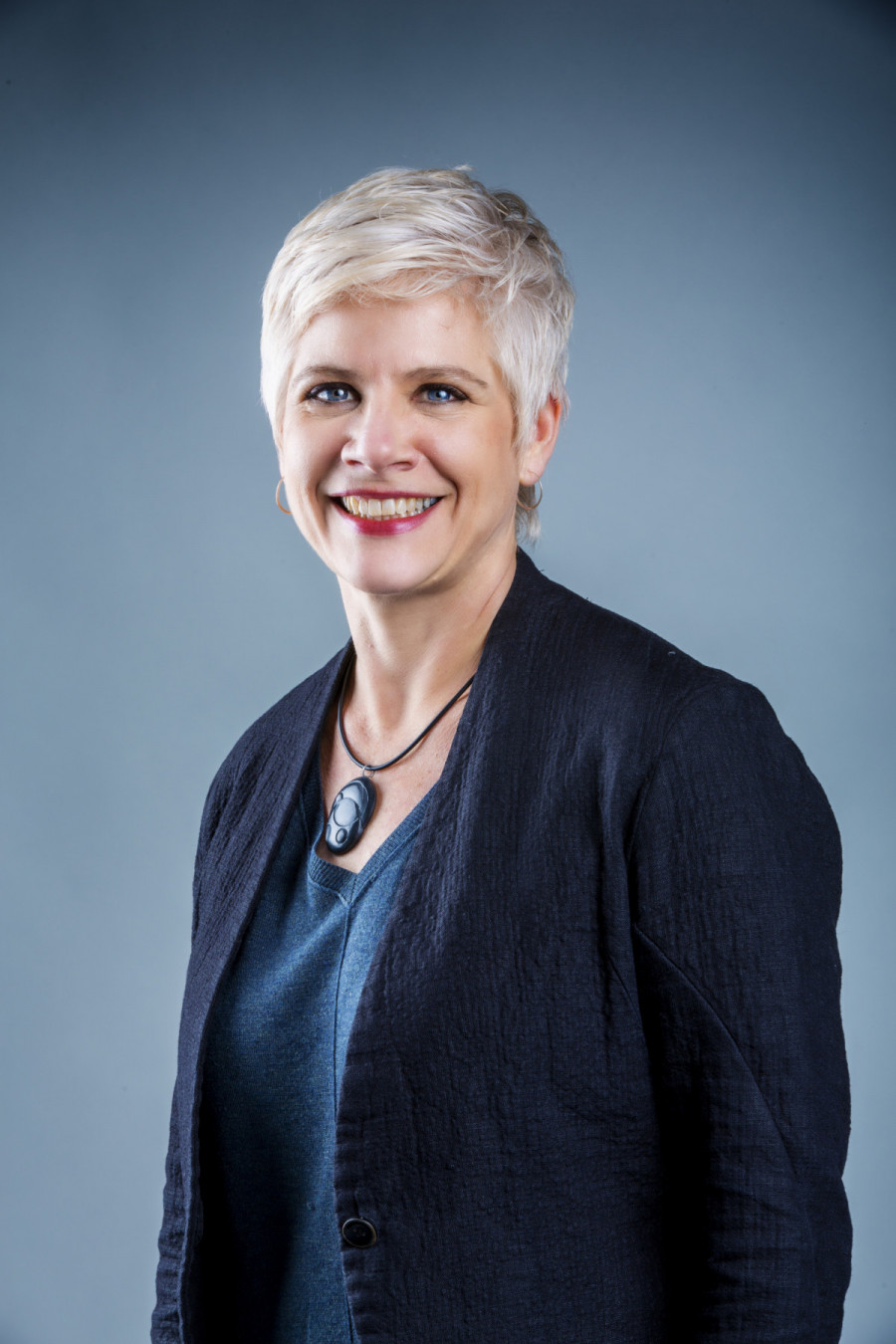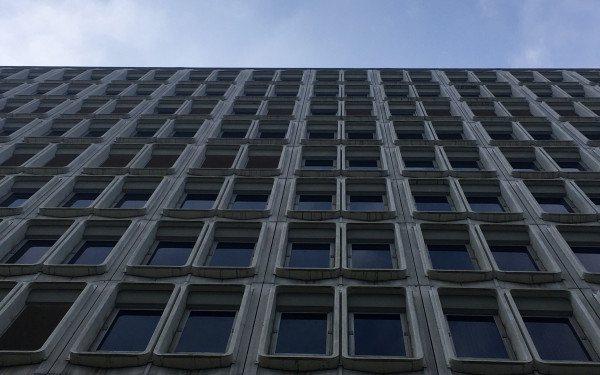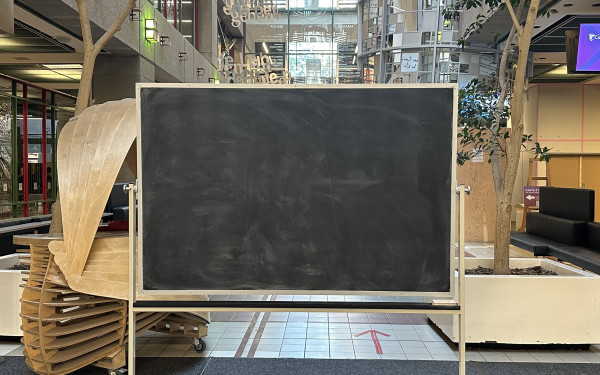A One-on-One With Provost Anne Whitelaw
Concordia’s Provost Sat Down With The Link to Discuss Student Issues
On Aug. 23, Concordia President Graham Carr sat down with The Link to answer questions about his role within the university. In tandem with the president, Concordia Provost Anne Whitelaw agreed to do the same on Sept. 7.
The role of the provost is to act as chief academic officer and ensure academic standards within the university. The role also entails heading efforts on equity, diversity and inclusion.
Answers have been edited for clarity.
From your perspective as provost, how do you think Concordia handled COVID-19 over the past two years?
I would say we handled COVID as well as we could. As I'm sure you know, what was going to happen from one week to the next was a giant question mark. What directives we were going to get from public health, what directives we were going to get from the ministry, what directives we were going to get from peers, what we were hearing from our faculty and students—I think we were managing a lot of things.
What we tried to do is put the student experience first. I still remember the first day of lockdown. Possibly a couple of days beforehand, we sat down with Sandra Gabriel, [Concordia’s] vice-provost of innovation in teaching and learning.
We said, okay, we're transitioning online. What do we have to do? Everything has to be on a Zoom platform so that students don't have to figure out one platform or the other—everything on Zoom. We will use Yuja, which has transcription and closed captioning.
We will train faculty on how to do it. We will encourage them to record their lectures for students who are in a whole range of difficulties. We were thinking of students who were sick, students who were anxious, students who had roommates, students who had children.
That was actually a very real one for us. You're trying to play with your kids, feed your kids, sleep with your kids, and you still have to look at a lecture. We were thinking about all of those things. Ultimately, I think we did as good a job as we could.
Many students are relieved to be fully back in-person this semester. On the other hand, several student groups have been asking for a more hybrid, flexible education model. What is your stance on this?
I think flexibility is good, and exploring different ways of learning is important. You probably know we've had consultations with students and faculty on learning, the learning environment and how we can think about what the future of teaching is going to look like. We've explored all of these options.
My suspicion is that many students assume that hybrid is actually a recorded class that's happening at the same time as an in-person class. For me, hybrid class is where you have some components that are online, which would be asynchronous—you could watch whenever it's convenient—but you would also have class time.
Let's say a class is three hours or two and a half hours long. It wouldn't be two and a half hours in addition to the lectures. It would be an hour of lecture, and then an hour and a half of hands-on experiential learning, so that you actually get to apply the knowledge you're getting in your lectures.
That, to me, is the way that we should be going, because it provides a combination of two things. If you're looking at asynchronous lectures, it gives students the time to really process and listen when and where it’s convenient for them. This way, the time that's spent in class is value added. That, to me, is where we should be going.
The past few years of COVID-19 have drained students’ mental health. Data from Statistics Canada suggests youth mental health is in an unprecedented state of crisis. How big of a priority is student mental health to the university?
Mental health generally is a priority for the university. For students, but also for our faculty members, who have a different kind of stress. It's important when we think about the mental health of students—there's mental health of students and there’s mental health of the age group students normally, but not entirely, belong to. This is something that universities can't be solely responsible for.
[Universities] are part of a health ecosystem. The way we need to think about how we can support our students is to work in collaboration with public health, CLSCs and other organizations to make sure we can offer as many options to our students as possible.
That's what we've really been trying to do. We realize that, yes, there's one-on-one counseling for particular kinds of cases, but then there are also a lot of other supports out there that can support students for the kind of anxieties and stress they're feeling. It's important to remember that mental health is on a spectrum. I think as a society, and the university being part of that, we have to have different ways of supporting all of those [on that spectrum].
Many students have complained about a lack of resources for mental health services on campus. Long waitlists at Health Services only worsen this. How will Concordia provide more concrete resources for students needing help with their mental health?
As I said before, you have to think about it as a spectrum. If the expectation is [every student is] going to see a counselor or psychologist and it's going to be a one-on-one session, we just can't do that. We don't have the financial resources. There aren't psychiatrists and counselors out there to be able to fulfill that mandate.
We need to direct students to get the support that they need. The Zen Dens, for example, which are embedded in all four faculties, are places where students and non-students can go get support, talk through things and work with, in some cases, therapy dogs. That might help alleviate certain kinds of concerns.
We've got other kinds of clinics that are across campus, and for cases where the only real solution is a one-on-one, then those are there as well.
A few months ago, a letter was published through the Concordia Student Union regarding mental health services pertaining to communities of colour. This letter addressed the mental health needs of Asian students. How will you provide resources for racialized students who don’t feel their mental health is prioritized?
This has been something I've been in conversation with the former Director of Campus Wellness and Support Services Gaya Arasaratnam. Elama Bloom is her replacement, so I'm sure I'll be having the same conversations with her.
I say this about Gaya because as a racialized person herself, she really wanted to make sure that there was support for racialized students in Health Services. She was having challenges being able to fill a role like that. She was not able to attract the personnel—there was a small number of personnel available.
One of the ways, thinking about the work that we do at Concordia as a partnership, is to say, “okay, what kind of community resources are available that we could partner with? How can we direct our students to them so they get the support they need?”
It's absolutely something on our radar. We keep looking at ways of diversifying the health personnel we have. It's also a conversation I'm having with the Black Perspectives Office, with the Equity Office, with Indigenous Directions, and there is peer support that we're absolutely putting in place.
Homeroom has a pod for incoming Black students. This year, we're developing bridging programs. That's a way of supporting students to feel more of a sense of belonging, finding their way in this enormous university.
There was an instance where a guest lecturer used a racial slur only a few months ago on campus. When it comes to talking about race in the classroom, how will you reassure students of colour they won’t be faced with these kinds of situations?
The training that we're doing through the equity office is widespread. We're working on developing more and more of those trainings to be able to understand the impact that words can have. [This includes being] able to separate an intellectual argument and being able to encourage critical thinking in students in ways that also acknowledge that there may be some students in the classroom for whom certain words are just considered to be violence.
[This includes] sensitizing people that the classroom is not [just] an intellectual space, it's a lived space. It's a space where our students bring their experience and their histories. We can't assume it's going to be the same for everyone.
Diversity is really understanding that there are different ways of learning, different ways of knowing, different experiences that we all have to engage with. Therefore, we need to just be respectful. I think it comes down to that sense of respect. Same thing with online bullying and other forms of inappropriate conduct. It is really about respect. It's about saying you need to think about how you're engaging with other people.
Professors are not alone in making sure the classroom operates smoothly: teaching assistants are a vital part of this ecosystem. TAs have been facing issues, including poor communication with professors, cuts in hours and poor handling of sexual assault claims. How will Concordia improve conditions for TAs?
There's work that can always be done in terms of training, working with faculty members and TAs so they understand their responsibilities and their roles within the classroom. This includes understanding the limits of those roles and being able to have conversations with faculty members when what they're being asked to do is inappropriate or outside the bounds of what normal TA work is being asked of them.
We're also working with faculty members to make sure they understand the roles of teaching assistants and the vital role that they play within the classroom and in the teaching environment. I think it sounds like I'm saying there's a lot of training, but there is a lot of training.
Especially coming out of the pandemic, there's something that I've really noticed in the virtual environment: there's almost a freedom from all sides for people to just say things that they would just never say in person. I think that this level of [disrespect] is something that we need to address as a university.
As a university, we really need to start thinking about how we create a respectful work and learning environment where people are accountable for their behaviour. We already have policies in place in terms of behavior that violates various codes. But in the online environment, it's a bit more difficult in some cases to assess and address. Certainly, if we're moving into a more hybrid environment, we really need to figure out how to deal with these situations.
Accessibility for students with disabilities has been a large issue as of late, especially because of COVID-19. Many students with disabilities have felt underserved by professors as well as the Access Centre. How will Concordia increase support for students with disabilities?
Accessibility is something that we are really thinking about in the broadest possible terms. Recently, the Equity Office hired an accessibility specialist, Anna Barrafato, who used to be with the Access Centre for Students with Disabilities. She's now in our office, but is also working with the Centre for Teaching and Learning so that we can start developing more training and guidelines on how to be more responsive and respectful to students with different needs.
That covers the range from not questioning why some who have registered with the Access Centre might need a little bit more time. They're not getting a free ride. They're not getting extra from what other students are getting. They're getting what they need to be able to perform to the best of their ability.
I think what we want for our students is for them to be able to perform to the best that they can do. The Access Centre is one tool, but it does not have enough resources. We need to look at how we're resourcing the Access Centre.
The way we also need to think about it is, what can faculty members take on? What can chairs take on? How can we provide a level of straight-up support for students who might need a little bit of time, might have to have some note-taking support and other components? I think those are things we can look at.
That feeling of being isolated was a big issue during the pandemic. I also think about students who, if they're very shy, if they’re from another country or province, might feel alone and might feel that they don't have a network of support. What can we do to create those kinds of networks so that students can help themselves? I say that not because we don't want to be able to provide support, but I think it's something that has to happen in collaboration.
During this academic year, what are some of the big projects you hope to begin or continue?
I am super excited to see the Task Force on Anti-Black Racism’s report coming out [at the end of October]. I've already seen it, I've read it, I've written the introduction. I think the recommendations are really strong—they're important recommendations. I'm really looking forward to the community as a whole getting a look at what this amazing group of people worked on for two years.
We're hosting the first powwow at Concordia on Sept. 26. I blocked my calendar. I told [Maria Acuna, Whitelaw’s executive assistant] no meetings, I'm going to the powwow. And I think it's exciting to see 30 years of Otsenhákta [Student Centre]. I think it's really important to see the work in our commitment to Indigenous communities and Indigenous Directions taking place.
I think sustainability is going to be the big thing this year. We're going to embark on a voluntary university review, which is looking at everything the university is doing from a sustainability standpoint, thinking about what we’re doing well and where we can improve.
This means doing an audit of not just our operations, but our policies, our teaching, all those elements. We’re really thinking about what the game plan is to get to a place where we are in fact not just supporting sustainability, but living sustainability at the university.
The School of Health is about to launch, which is really exciting. There's so much stuff happening in the equity arena, which is one of [the] things I'm a huge champion of.
I think everyone's waiting to see how this first year where we feel like we're perhaps moving out of the pandemic is going to look like. And so far, we're just so happy to see students. We're so happy to have conversations with our faculty and our staff. I think it's going to be a period of adjustment.
This is the year where we figure out what Concordia is going to be like for the long term, because we're not going back to pre-pandemic. We're doing something different. So, how radical can we be in terms of what we do differently?






_600_375_90_s_c1.jpg)
